Share

Invisible Not Broken - Chronic Illness Podcast Network
Searching For A Diagnosis Prescious My Prescious: A Chronic Illness Podcast
Show Notes For This Weeks Chronic Illness Podcast
- What it’s like when ALL your medical tests show you are the healthiest sick person
- Oh that’s a thing and the amazing crazy things your body can do with chronic illness
- You know that feeling when you can’t breathe…yay like that most of the time
- Is it Prednisone or is it LSD?
- Show & Tell Can Go Horribly Wrong With Chronic Illness
- No Diagnosis means no protocol
- Searching for a Diagnosis on Dr. House …It’s Not Lupus, right?
- Chronic Illness Diagnosis hunting worst, most expensive, and time-consuming hobby
- The loneliness Of Not Having A Diagnosis
- Land Of Opportunity Only Counts If Everyone Can Get Health Insurance ( A Small business perspective)
- If you have anxiety already your new symptoms are NOT anxiety. You know when it is different.
- Seriously Trying to keep up with all the symptoms The entire body went into revolt
- Spin classes a religion be NICE when someone runs out
- Gluten Free does not mean that you are THAT person
- What to do to Take Care Of The Chronically Ill Person In Your Life if You want to do more than “thinking of You”
- Hormones Strike Again Periods & Chronic Illness
- Whats powering through and what is self-sabotage
- Cats As Relaxation Gurus
- If you are going to search for a diagnosis you should get medical school credit
- Protocol For Taking Care Of Chronically Ill Friends (Originally Made For a Community To Help Cancer Patients during radiation and chemo)
What is your disorder? *
undiagnosed
At what age did your disorder become a daily issue? *
20
Who were you before your illness became debilitating? *
Before my big flare last year I was always busy- childhood through adulthood. I love being busy and feeling productive. I teach special education full time and was teaching between 5-10 classes per week at the gym on top of that, not to mention my two workouts. Over the last year or two, my energy levels and health fluctuated often and began to crash last November. I probably was fading before that but was unable to notice. I think I started to realize how sick I was when it was finally confirmed that I was sick and the symptoms were not from depression. Once I knew that my inability to push through was because my body is most likely attacking itself in one way or another, I realized I had been pushing through exhaustion for quite a while. I was under the impression that I was becoming unmotivated and lazy.
What would you do if you were not dealing with your invisible illness? *
If I were not dealing with an invisible illness I would still be teaching at the gym and doing intense workouts for sure. I LOVE taking fitness classes and trying new styles. I haven’t been able to do cardio or lift “heavy” in about 7 months and my strength and endurance have decreased significantly in that span as well. Fitness was something I found when I moved home after graduation. Moving back in with my parents, I needed to find an outlet. To be honest, I’ve tried to let go of a lot of the thoughts about what I’ve “lost” and focus on what I’ve gained. I also am trying to believe I haven’t truly “lost” anything, but that I’m in a moment of flare and hopefully can find a happy medium in the future. Had I not had to slow down I would not have discovered new passions I have explored. Lately, I have been trying to combine my love for fitness with my passion for photography. I’ve had great opportunities to do photo shoots for a friend of mine at her fitness studio, Garage Girl Fitness.
What would you like people to know about your daily life? *
This is a hard one! I guess I would tell people that I’m sorry if I ever bailed on you last minute or have seemed flakey. My symptoms are so unpredictable from day to day that it is hard for me to commit to plans far in advance. So much of my energy goes to work that it is hard to accomplish much else than the school day sometimes. I have not discovered my happy medium yet and still seem to overdo it on good days leading to very drained days shortly afterward, which is probably why it is so confusing and hard for others to understand- or at least why I’m paranoid they don’t understand. I get scared people may feel I am faking it when a bad day follows a great day. I’m high energy one day (and by high energy, I still mean about 1/10th of the amount I was able to have and sustain in the past) and can barely keep my eyes open or stand up for more than a few minutes the next. I want everyone to know that if I did cancel on them, that it took a lot of preventative care prior in order to make that decision. I most likely rested and implemented various other self-care practices even more than usual leading up to the event whether it be a lunch date or a formal event.
What would make living and moving in the world easier for you? *
Something that could sort and put away my laundry for me!
Do you have any life hacks? *
Google Drive! Google Drive has been a lifesaver. We started using it at work last year and I realized how useful it is. I am able to upload all of my test results etc. to a drive and share access with my doctors. Being undiagnosed, I've seen so many different kinds of specialists that each has their own opinions. My primary care is through a local hospital so I began with staying "in network" and utilizing their specialists. As much as I hoped that they would all work out, I'm currently looking into finding a rheumatologist in Boston. Being so close to some of the best hospitals in the world, I figure it is silly to not utilize those resources. My "key player" has been a naturopath/functional medicine doctor in New Hampshire. She is not in the same network as my primary care so the google drive has been very useful. I've been able to track my symptoms, diet, activity level, etc. on a spreadsheet that my naturopath is able to check it at any time. She's actually emailed me on a Sunday to clarify something!
What kind of support do you get from family or friends? *
I will be honest, I'm VERY bad at asking for help and I like to think I am good at putting on a front. The first thing that comes to mind isn't what one usually expects, but I am the luckiest person in the world for having the landlords that I have. They have two dogs that I have over all the time, which is amazing. It's like I have dogs but do not have to worry about being home for them, vet bills, etc. But honestly, that is the least of it. They do so many things to take care of me and I'm not sure I would make it without them. There have been days when I am so sick I cannot even handle the stairs never mind driving myself anywhere. They've left me Gatorade and crackers or prescriptions at my door when I'm too sick to function. They remind me when my oil may be getting low, get me back in when I've locked myself out, plow the driveway when it snows, Ranee has even broken in to wake me up when I overslept! I'm not saying that my other friends and family are not helpful, this is just the most unexpected and lucky form of helpful I have in my life :) I have close friends from high school and college and they are always here to check in, talk, etc. Now that we are all scattered it's a bit more difficult to be around each other in person, especially since I'm pretty spent just after getting ready some days! But no matter what they are always here for me and things never change when we see each other. My friend and personal trainer Rose has been an amazing friend and support system as well. She has built an amazing atmosphere at her fitness studio making me and others feel comfortable at all times. I cannot believe the relationships we have built and truly feel I have found family here. My family, of course, helps as well! I do, however, feel like I downplay how I am feeling at times because I'm scared they will worry, therefore I'm not sure they are always aware of the help I may need. It's not that I am not close, honest, or open with them, I just don't have any answers and I know my mother's reaction will be question after question after question so at times I feel like I may as well tell her AFTER it is figured out when I have a response versus in the moment and having to use my remaining energy to calm HER down.
Have you ever had someone not believe you have an invisible illness because of your appearance? *
I don't think so...not that anyone has brought to my attention. I do get self-conscious using the elevator at work sometimes though. I integrate my students in and out of the general education classroom and we walk back and forth from the first to third floor often. I held out for as long as possible but have now begun to use the elevator on tougher days.
Has this been a positive or negative experience? *
There are positives and negatives. Like I mentioned before, I do feel I have much positive to focus on despite the negative that has and is happening. I have been able to find and explore new passions as well as embrace my students and teaching job in a new way. Many of my students are very picky with food, as this is common with Autism. When children are picky to a point that they will not eat things due to texture or sensory reasons they can develop deficiencies etc. just like any other person can. I've been using my "leaky gut" and change of lifestyle as a teachable moment for my kids. We do a nutrition unit a couple times a week using the MyPlate model. I've watched two of them start to try school lunch after eating the same exact lunch day in and day out since the day they started school at 3 (they are now 8!). I stood in the cafeteria taking pictures of them in line like a proud mom!
How has your invisible illness affected your relationships? *
I think it has in the fact that I have not seen people as often in person. But I am still navigating the social life while sick piece so I try not to come to any hasty conclusions before I rule out any of my faults first.
Is there anything you are afraid to tell even the people closest to you? *
Oh boy......honestly I will have to think about this one leading up to when we speak later :)
Does the fact that your disease is invisible change how healthcare professionals treat you? *
I think the biggest piece that made/makes healthcare professionals treat me differently is my mental health past. There are so many symptoms that are due to chronic illness (not mental) that were written off as part of my anxiety, previous eating disorder, depression etc. To me, my history with these things should make my opinion even more valid that the symptoms are not part of it. I can tell the difference between the two now and wish that knowledge could be used to my benefit versus a write-off.
What is your best coping mechanism? *
My best coping mechanism lately is photography. It helps me accomplish a form of meditation- getting me out of my own head and into the moment.
What are you the most fearful of and hopeful for in the future? *
I guess I'm most fearful that things will never calm down. It's hard to watch all of your friends getting engaged and married, starting families, buying homes, etc. while I'm trying to figure out if there's a way I can get insurance to cover Zyrtec D so that I'm not spending $30+ a month on just one of my medications. So much of my money and time goes into my health I just hope that I find an equilibrium soon so that I can even just begin to think about planning, saving, etc.
What is your favorite swear word?
Fuck :) My weakness as a teacher is also when students swear. When kids swear I can't help but laugh!
Is there anything you want to make sure we talk about during the interview? Like an organization you want to promote or something specific that you deal with.
I would love to mention my friend's studio Garage Girl Fitness if possible as it has been a huge resource and support system for me :)
What is the hardest and/or best lesson your condition has taught you?
I guess the hardest and best lesson I have learned is how strong I actually used to be. I truly had no idea of the strength my body had until it began to somewhat crash.
More episodes
View all episodes
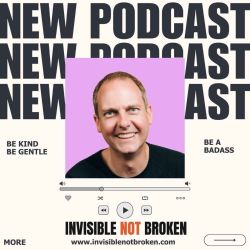
Vulnerability, Resiliency, and Advocacy with Tim Reitsma
47:06Monica Michelle is joined by consultant and podcast host Tim Reitma.Tim lives with Crohn's Disease.In this episode, Monica and Tim discuss: Tim’s resiliency through managing his Crohn’sThe importance of self-advocacy, especially in the workplace Tim’s podcast why he shares stories of those with invisible illness TIMESTAMPS00:47 - Tim's diagnosis 06:31 - How and why Tim applies self advocacy15:41 - Why Tim started his podcast22:42 - Invisible condition etiquette31:00 - What HR can do better for employees with invisible illness39:31 - Tools Tim uses to care for his Crohn’s outside the homeThe full transcript and all links mentioned can be found on the episode page on invisiblenotbroken.com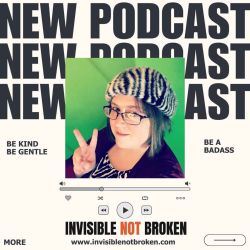
Tech and Disability: What VR Offers the Disabled Community with Sunny Ammerman
01:10:27Monica Michelle is joined by artist and disability advocate Sunny AmmermanSunny lives with Septo-optic dysplasia, panhypopituitarism, Optic Nerve Hypoplasia, and is missing a membrane in the brain called the "septum pellucidum".In this episode, Monica and Sunny discuss: Sunny’s complex disorders and how she copes with themEverything VR provides from accessible gaming, social platforms and the potential for better online education.Various VR/AR games and their gameplay Sunny’s VR support groupTIMESTAMPS00:45 - What VR/AR offers for chronically ill and disabled folks11:57 - Sunny’s conditions and how she copes with them17:55 - Features that make VR games accessible or inaccessible as well as different games and their play experiences37:13 - The social aspects of virtual gaming51:32 - What opportunities VR has for the future1:04:49 - Sunny’s VR support group The full transcript and all links mentioned can be found on the episode page on invisiblenotbroken.com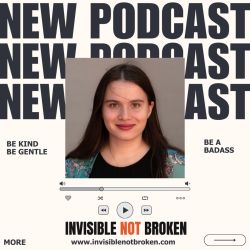
Reporting on Chronic Illness and Disability with Journalist Julia Metraux
39:16Monica Michelle is joined by Journalist Julia Metraux.Julia lives with vasculitis, mild to moderate hearing loss, and has experienced long COVID.In this episode, Monica and Julia discuss: Julia's diagnosis with vasculitis and how it influences her journalistic lensHow community impacts the mental health of those with chronic illnessHow Julia and Monica find positives and negatives in the internet spaces for chronically ill and disabled folksThe politics of how government, businesses, and celebrities influence the chronic illness community TIMESTAMPS00:32 - Julia's diagnostic journey07:02 - Julia’s work reporting on the online community of chronic illness 16:32 - The effect of Internet communities on chronically ill and disabled folks26:46 - How Julia’s illness impacts her work, both in what she writes about and how she manages her lifestyleThe full transcript and all links mentioned can be found on the episode page on invisiblenotbroken.com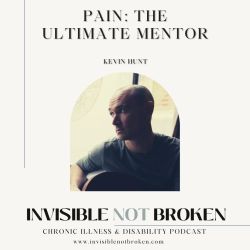
Author of “Pain: The Ultimate Mentor,” Physiotherapist Kevin Hunt
31:29Monica Michelle is joined by author & physiotherapist Kevin Hunt.Kevin lives with chronic pain.In this episode, Monica and Kevin discuss: Kevin’s philosophy of pain management as a physiotherapist who experiences chronic pain. The Hexagon Model, a life-management tool for focusing on what’s important to you.Kevin’s idea behind his new book.Using pain as a guide.TIMESTAMPS00:34 - Kevin’s work as a physiotherapist specializing in the experience of pain 06:44 - The Hexagon Model for managing your life’s needs14:00 - Putting aside the idea of a “quick fix”19:45 - Kevin’s personal experience with pain and how he uses it with patients28:44 - Kevin’s book, “Pain: The Ultimate Mentor”The full transcript and all links mentioned can be found on the episode page on invisiblenotbroken.com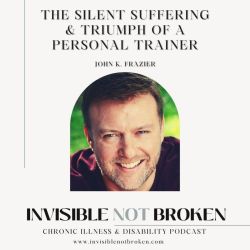
Author of “Through the Pain: The Silent Suffering & Triumph of a Personal Trainer”: John K. Frazier
28:35Monica Michelle is joined by author & personal trainer John K. Frazier.John lives with ankylosing spondylitis.In this episode, Monica and John discuss: John’s work as a physical trainer and authorChronic pain comparisonsPersonal triumphTIMESTAMPS00:50 - John’s business & diagnosis07:19 - Chronic pain olympics09:31 - Talking about & hiding a diagnosis15:09 - Personal triumph18:24 - Staying in the present23:29 - The superman complexThe full transcript and all links mentioned can be found on the episode page on invisiblenotbroken.com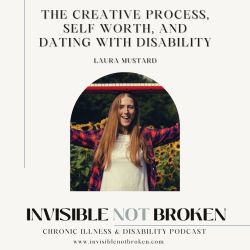
The Creative Process, Self Worth, and Dating with Disability: Laura Mustard
31:08Monica Michelle is joined by musician Laura Mustard.Laura lives with VATER syndrome.In this episode, Monica and Laura discuss: Laura’s inspiration for her upcoming musical EP.How Laura’s illness impacted her recent relationship & self-image.Laura’s creative process, new music, and social media pressure.TIMESTAMPS00:30 - Laura’s new EP / Monica’s recent COVID experience05:32 - Relationships with chronic illness11:20 - Image and self acceptance with disability15:32 - Laura’s creative process and current projects20:05 - Pursuing creativity despite social media attentionThe full transcript and all links mentioned can be found on the episode page on invisiblenotbroken.com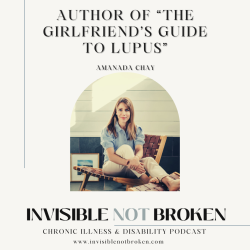
Author of “The Girlfriend’s Guide to Lupus”: Amanda Chay
30:43Monica Michelle is joined by author Amanda Chay.Amanda lives with Sjögren’s and Lupus.In this episode, Monica and Amanda discuss: Amanda’s book & diagnosisOutlooking on work & writingNavigating chronic illness with kids & familyTIMESTAMPS00:26 - Intro + The Girlfriend’s Guide to Lupus02:17 - Amanda’s diagnosis10:09 - Amanda’s outlook on writing17:11 - Navigating chronic illness with kids & family23:29 - Labels and roles26:24 - Flare reads & closing remarksThe full transcript and all links mentioned can be found on the episode page on invisiblenotbroken.com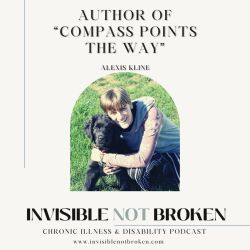
Author of “Compass Points the Way”: Alexis Kline
23:14Monica Michelle is joined by author Alexis Kline.Alexis lives with Dysautonomia.In this episode, Monica and Alexis discuss: Being a sick teenagerHaving an isolated diagnosisProductivity workflowsTIMESTAMPS00:28 - Alexis’s diagnosis & dog07:18 - Sick teenager road map10:00 - Alexis’s book & workflow16:25 - Having an isolated diagnosis20:50 - Wildlife photography, purchases The full transcript and all links mentioned can be found on the episode page on invisiblenotbroken.com
Author of “From the Sidelines to the Finish Line”: Emily Falcon
36:47Monica Michelle is joined by author Emily Falcon.Emily lives with ALCAPA.In this episode, Monica and Emily discuss: Growing up sickPost-surgery supportHaving a public bodySelf-motivation and adventuringTIMESTAMPS00:28 - Being a sick kid & Emily’s book title07:28 - Mortality10:16 - Portrayal of disability in media12:21 - Post-surgery support19:23 - Having a public body23:43 - Self-motivation29:46 - Emily’s tips for adventuresThe full transcript and all links mentioned can be found on the episode page on invisiblenotbroken.com